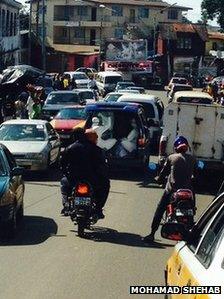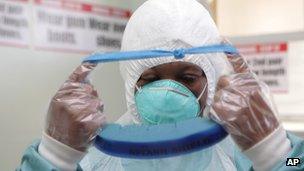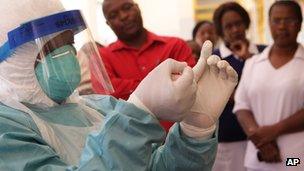Ebola fear: 'Having a small fever makes you very afraid'
- Published
Abba Abashi, Liberian-Nigerian student: "My mum caught me crying"
At least 2,800 people have now died in the Ebola outbreak in West Africa. The World Health Organization has warned the number of infections will increase to 20,000 by November if efforts to control the spread are not stepped up.
The hardest-hit countries are Liberia, Guinea and Sierra Leone.
The deadly virus is transmitted through body fluids such as sweat, blood and saliva, and there is no proven cure. This makes life feel very precarious for people living in affected areas.
People from Liberia and Sierra Leone tell the BBC what it is like living in fear of Ebola.

Abdul Kabia, Freetown in Sierra Leone

A body is driven to a cemetery in Sierra Leone
One of the most shocking, sad and sorrowful experiences of my life was the death of my auntie.
She was the woman who brought me up.
She felt unwell for a short while and then was diagnosed with Ebola. A surveillance team came to confirm the death and told me that another team would come to take samples of her saliva and blood. When that team came, they were dressed in white medical overalls. They told us not to go near my auntie's body because the virus would still be very active.
Then another team came. The burial team came. We told them that we would not give them her body until they could prove she had died from Ebola. The burial team then called for police enforcement and the corpse was taken forcefully.
My auntie was put in the back of a van with six other corpses. We followed them to the cemetery where Ebola cases are sent to be buried but armed men did not allow us to enter because of infection. They buried 17 corpses in a mass grave. This was the one of the saddest days of my life.

M Sahr Nouwan, Liberia
My brother-in-law's wife became very unwell and she had to go to the hospital. But she died in the car before she got there.
All my family were very upset but also very afraid of contracting the virus.
The symptoms started to develop in people that had been in contact with her - about eight people developed signs and died. My wife's brother did not contract Ebola, nor did my wife - we were lucky.
Many people who have Ebola are afraid to go to the hospital. I want to encourage people to get help. There are fewer clinics open and many deaths are due to the poor response of health officials. They need to increase the numbers of medics, social workers and facilities to fight this virus.

Nyuma Bondi, Monrovia in Liberia

I know people who have died from this deadly Ebola virus. A doctor who had been helping sick people in my community - even when public hospitals were closed - contracted the virus and died. A newspaper reporter has also died and one family lost three of its members.
Since the outbreak, all hospitals have been closed throughout the country. There are virtually no treatment centres. The ones that exist are filled to capacity and are no longer accepting new cases. Nurses and doctors have abandoned the hospitals because of fear of the virus.
People have a sort of denial mentality - most Liberians from remote and suburban areas of the country don't believe that the Ebola virus is real.
Some confirmed Ebola patients are escaping treatment centres. A lady who was diagnosed escaped the quarantine centre in Lofa where the outbreak started. Everyone who had been in direct contact with her became infected and only one doctor survived. So lying about infection is also responsible for the huge death rates in Liberia.
I wash my hands regularly with soap. I clean my clothes and I never shake hands with people. I try to protect myself and my family.

Emmett P Chea, Liberia
The Ebola outbreak has been like someone firing live bullets. Liberia is too poor to deal with this unaided. Thousands more will die if the international community does not come to our rescue.
The closing of hospitals and clinics in and around Monrovia has been one of the major factors increasing the deadly Ebola virus death rate because people who are coming down with the symptoms of malaria, high blood pressure, diabetes and diarrhoea are not able to get adequate treatment with the closure of health facilities.

Lionel Z Fredericks, Paynesville in Liberia

A health worker in protective clothing
The Ebola virus disease has upset my life. I'm a medical student and I should have sat my exams by now but the Liberian government closed all schools in August.
We now live in fear and it is so intense that even having a small fever makes you very afraid.
I tried to avoid mosquito bites as I don't want even getting the slightest illness.
I have lost friends and colleagues. They should build a memorial to those who have died when this killer virus is eradicated.

James Smith Wallace, Liberia
A friend of mine died from Ebola. It is very frustrating - you never know when you are at risk even when we are all following the prevention guidelines.
The health centres are too crowded. Relatives go there to see their loved ones die and they catch Ebola too. People are coming out of the isolation centres and are putting everyone at risk.